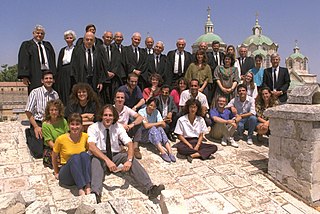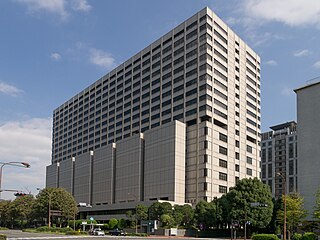Related Research Articles

A barrister is a type of lawyer in common law jurisdictions. Barristers mostly specialise in courtroom advocacy and litigation. Their tasks include taking cases in superior courts and tribunals, drafting legal pleadings, researching the law and giving expert legal opinions.
A sheriff is a government official, with varying duties, existing in some countries with historical ties to England where the office originated. There is an analogous, although independently developed, office in Iceland that is commonly translated to English as sherif.
A county court is a court based in or with a jurisdiction covering one or more counties, which are administrative divisions within a country, not to be confused with the medieval system of county courts held by the high sheriff of each county.

The Supreme Court of Canada is the highest court in the judicial system of Canada. It comprises nine justices, whose decisions are the ultimate application of Canadian law, and grants permission to between 40 and 75 litigants each year to appeal decisions rendered by provincial, territorial and federal appellate courts. The Supreme Court is bijural, hearing cases from two major legal traditions and bilingual, hearing cases in both official languages of Canada.

A bailiff is a manager, overseer or custodian – a legal officer to whom some degree of authority or jurisdiction is given. Bailiffs are of various kinds and their offices and duties vary greatly.

Robin Brunskill Cooke, Baron Cooke of Thorndon was a New Zealand judge and later a British Law Lord and member of the Judicial Committee of the Privy Council. He is widely considered one of New Zealand's most influential jurists, and is the only New Zealand judge to have sat in the House of Lords. He was a Non-Permanent Judge of the Court of Final Appeal of Hong Kong from 1997 to 2006.

The High Court of Australia is Australia's apex court. It exercises original and appellate jurisdiction on matters specified within Australia's Constitution.
Associate justice or associate judge is a judicial panel member who is not the chief justice in some jurisdictions. The title "Associate Justice" is used for members of the Supreme Court of the United States and some state supreme courts, and for some other courts in Commonwealth of Nations countries, as well as for members of the Supreme Court of the Federated States of Micronesia, a former United States Trust Territory. In other common law jurisdictions, the equivalent position is called "Puisne Justice".
The chief justice is the presiding member of a supreme court in many countries with a justice system based on English common law, such as the High Court of Australia, the Supreme Court of Canada, the Supreme Court of Ghana, the Court of Final Appeal of Hong Kong, the Supreme Court of India, the Supreme Court of Ireland, the Supreme Court of Japan, the Supreme Court of Nepal, the Supreme Court of New Zealand, the Supreme Court of Nigeria, the Supreme Court of Pakistan, the Supreme Court of the Philippines, the Supreme Court of Singapore, the Supreme Court of the United States, and provincial or state supreme courts/high courts.

The Tipstaff is an officer of a court or, in some countries, a law clerk to a judge. The duties of the position vary from country to country. It is also the name of a symbolic rod, which represents the authority of the tipstaff or other officials such as senior police officers.

A law clerk, judicial clerk or judicial assistant is a person, generally someone who provides direct counsel and assistance to a lawyer or judge by researching issues and drafting legal opinions for cases before the court. Judicial clerks often play significant roles in the formation of case law through their influence upon judges' decisions and perform some quasi-secretarial duties. Judicial clerks should not be confused with legal clerks/paralegals, court clerks, or courtroom deputies who perform other duties within the legal profession and perform more quasi-secretarial duties than law clerks, or legal secretaries that only provide secretarial and administrative support duties to attorneys and/or judges.
The Supreme Court is the highest court in Israel. It has ultimate appellate jurisdiction over all other courts, and in some cases original jurisdiction.

The Supreme Court of Virginia is the highest court in the Commonwealth of Virginia. It primarily hears direct appeals in civil cases from the trial-level city and county circuit courts, as well as the criminal law, family law and administrative law cases that are initially appealed to the Court of Appeals of Virginia. It is one of the oldest continuously active judicial bodies in the United States. It was known as the Supreme Court of Appeals until 1970, when it was renamed the Supreme Court of Virginia because it has original as well as appellate jurisdiction.

In the judicial system of Japan, the Constitution of Japan guarantees that "all judges shall be independent in the exercise of their conscience and shall be bound only by this constitution and the Laws". They cannot be removed from the bench "unless judicially declared mentally or physically incompetent to perform official duties", and they cannot be disciplined by executive agencies. Supreme Court judges, however, may be removed by a majority of voters in a referendum that occurs at the first general election following the judge's appointment and every ten years thereafter. The judiciary was far more constrained under the Meiji Constitution than it is under the present Constitution and had no authority over administrative or constitutional law cases. Moreover, the Ministry of Justice had complete and direct control over the courts' administrative affairs. Nonetheless, Professor John Haley argues that the courts maintained complete independence in the adjudication of particular cases. "Judicial independence from the political branches was emphatically established as a fundamental principle of governance in Article 57 of the Meiji Constitution. Of all branches of government only the courts exercised authority 'in the name of the Emperor'." Haley argues that this was and remains a matter of great pride for Japanese judges and notes that "placed prominently in all courtrooms was the inscription 'in the name of the Emperor' as a meaningful reminder to imperial officials and subjects alike that the Emperor's judges were not subject to political control or direction."

A supreme court is the highest court within the hierarchy of courts in most legal jurisdictions. Other descriptions for such courts include court of last resort, apex court, and highcourt of appeal. Broadly speaking, the decisions of a supreme court are not subject to further review by any other court. Supreme courts typically function primarily as appellate courts, hearing appeals from decisions of lower trial courts, or from intermediate-level appellate courts.

The Montana Supreme Court is the highest court of the state court system in the U.S. state of Montana. It is established and its powers defined by Article VII of the 1972 Montana Constitution. It is primarily an appellate court which reviews civil and criminal decisions of Montana's trial courts of general jurisdiction and certain specialized legislative courts, only having original jurisdiction in a limited number of actions. The court's Chief Justice and six Associate Justices are elected by non-partisan, popular elections. The Montana Supreme Court meets in the Joseph P. Mazurek Building in Helena, Montana, the state's capital, an international style building completed in 1982 and named in the honor of former Montana Attorney General, Joseph P. Mazurek.

In United States federal courts, magistrate judges are judges appointed to assist U.S. district court judges in the performance of their duties. Magistrate judges generally oversee first appearances of criminal defendants, set bail, and conduct other administrative duties. The position of "magistrate judge" or "magistrate" also exists in some unrelated state courts.
Bryan Alan Beaumont was a Judge of the Federal Court of Australia from May 1983 until February 2005. He also held positions in the legal systems of Pacific countries including Papua New Guinea, Tonga, Fiji and Vanuatu.

The Judiciary of California or the Judicial Branch of California is defined under the California Constitution as holding the judicial power of the state of California which is vested in the Supreme Court, the Courts of Appeal and the Superior Courts. The judiciary has a hierarchical structure with the California Supreme Court at the top, California Courts of Appeal as the primary appellate courts, and the California Superior Courts as the primary trial courts.

The judiciary of Ethiopia consists of dual system with parallel court structures: the federal and state courts having independent administration. The FDRE Constitution vested federal authority to the Federal Supreme Court which is cassation division and presides determining and overturning decisions made by the lower federal courts with itself has regular division assigned to review fundamental errors of law. Article 3, 4 and 5 stipulates the governance of federal courts over national and international aspects.
References
- 1 2 3 Federal Court of Australia website, 'Judges' Associates', retrieved 23 February 2017.
- 1 2 High Court of Australia website, 'Applying for an associateship with a Justice of the High Court of Australia', retrieved 23 February 2017.
- 1 2 3 4 NSW Supreme Court website, 'Applying for a Tipstaff position at the Supreme Court', retrieved 23 February 2017.
- ↑ J. Donnolly, 'A Tippy Path to the Bar', Bar News, Autumn 2011, 54, retrieved 23 February 2017.
- ↑ David Solomon. Nepotism, patronage and public trust: appointments to government offices. 2014. The Sydney Morning Herald.
- ↑ Bri Lee. Eggshell Skull. Allen & Unwin. 2018.
- ↑ Katherine G Young, 'Open Chambers: High Court Associates and Supreme Court Clerks Compared' (2007) 31 Melbourne University Law Review 646, 657-61.
- ↑ William Robert Cole. The Law and Practice in Ejectment. H Sweet. London. 1857. p 273
- ↑ Statutes at Large. King's Printer. London. 1764. p 26
- ↑ James Donovan. Courtroom Procedure in New Zealand: A Practitioners survival kit. CCH New Zealand Ltd. 2008. pp 8 and 9
- ↑ James Donovan. Courtroom Procedure in New Zealand: A Practitioners survival kit. CCH New Zealand Ltd. 2008. p 23
- ↑ Parliamentary debates. Volume 125. 1908. Page 369.